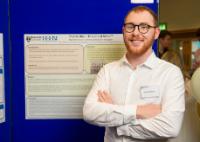2017 Participants
 William Redfearn
William Redfearn
Pesticides have been linked to colony collapse disorder, which plays a role in the declining number of bees worldwide. Exposure to pesticides occurs when foragers collect pollen from treated plants. I hypothesised that bees could not taste these pesticides.
A proboscis extension reflex (PER) response was elicited using 1M sucrose. The test substance was introduced to mouthparts and individuals were scored depending on their behaviour. 1 was awarded to bees that consumed the solution and 0 if they did not consume, but did not retract their proboscis. A ‘#’ meant the proboscis was retracted (behavioural response to bitter substances).
From the range of pesticide concentrations tested (100nM, 10nM and 1mM in 1M sucrose), data suggests either the bees could not taste, or that they liked the taste of, all the test solutions. Varying sucrose concentrations of the solutions could determine which.
Funding source: The Physiological Society
Supervisor: Dr Nicola Kay Simcock
